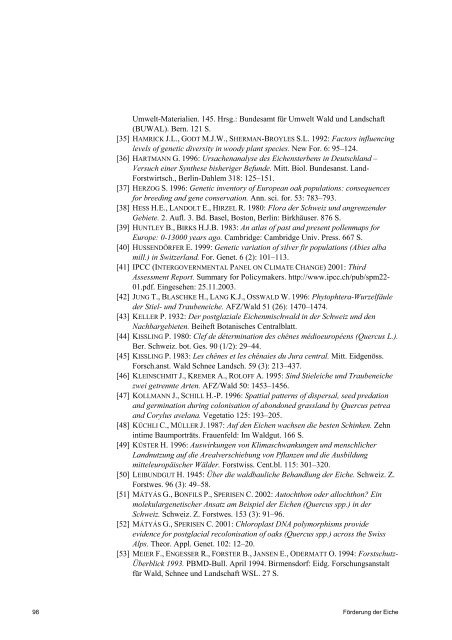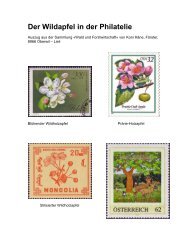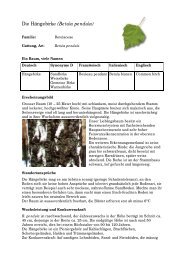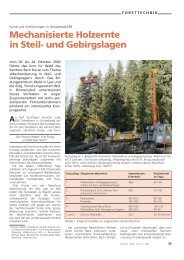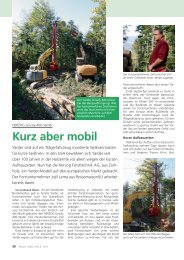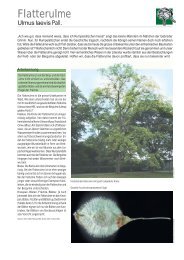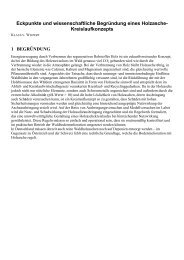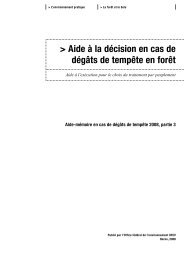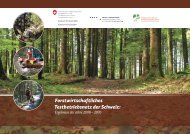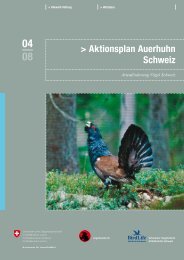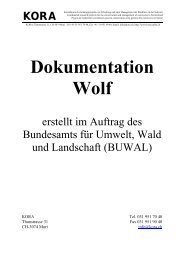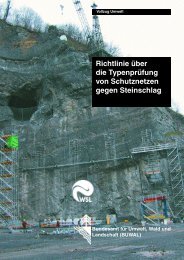Umwelt-Materialien. 145. Hrsg.: Bundesamt für Umwelt Wald und Landschaft(BUWAL). Bern. 121 S.[35] HAMRICK J.L., GODT M.J.W., SHERMAN-BROYLES S.L. 1992: Factors influencinglevels of genetic diversity in woody plant species. New For. 6: 95–124.[36] HARTMANN G. 1996: Ursachenanalyse des <strong>Eiche</strong>nsterbens in Deutschland –Versuch einer Synthese bisheriger Befunde. Mitt. Biol. Bundesanst. Land-Forstwirtsch., Berlin-Dahlem 318: 125–151.[37] HERZOG S. 1996: Genetic inventory of European oak populations: consequencesfor breeding and gene conservation. Ann. sci. for. 53: 783–793.[38] HESS H.E., LANDOLT E., HIRZEL R. 1980: Flora <strong>der</strong> Schweiz und angrenzen<strong>der</strong>Gebiete. 2. Aufl. 3. Bd. Basel, Boston, Berlin: Birkhäuser. 876 S.[39] HUNTLEY B., BIRKS H.J.B. 1983: An atlas of past and present pollenmaps forEurope: 0-13000 years ago. Cambridge: Cambridge Univ. Press. 667 S.[40] HUSSENDÖRFER E. 1999: Genetic variation of silver fir populations (Abies albamill.) in Switzerland. For. Genet. 6 (2): 101–113.[41] IPCC (INTERGOVERNMENTAL PANEL ON CLIMATE CHANGE) 2001: ThirdAssessment Report. Summary for Policymakers. http://www.ipcc.ch/pub/spm22-01.pdf. Eingesehen: 25.11.2003.[42] JUNG T., BLASCHKE H., LANG K.J., OSSWALD W. 1996: Phytophtera-Wurzelfäule<strong>der</strong> Stiel- und Traubeneiche. AFZ/Wald 51 (26): 1470–1474.[43] KELLER P. 1932: Der postglaziale <strong>Eiche</strong>nmischwald in <strong>der</strong> Schweiz und denNachbargebieten. Beiheft Botanisches Centralblatt.[44] KISSLING P. 1980: Clef de détermination des chênes médioeuropéens (Quercus L.).Ber. Schweiz. bot. Ges. 90 (1/2): 29–44.[45] KISSLING P. 1983: Les chênes et les chênaies du Jura central. Mitt. Eidgenöss.Forsch.anst. Wald Schnee Landsch. 59 (3): 213–437.[46] KLEINSCHMIT J., KREMER A., ROLOFF A. 1995: Sind Stieleiche und Traubeneichezwei getrennte Arten. AFZ/Wald 50: 1453–1456.[47] KOLLMANN J., SCHILL H.-P. 1996: Spattial patterns of dispersal, seed predationand germination during colonisation of abondoned grassland by Quercus petreaand Corylus avelana. Vegetatio 125: 193–205.[48] KÜCHLI C., MÜLLER J. 1987: Auf den <strong>Eiche</strong>n wachsen die besten Schinken. Zehnintime Baumporträts. Frauenfeld: Im Waldgut. 166 S.[49] KÜSTER H. 1996: Auswirkungen von Klimaschwankungen und menschlicherLandnutzung auf die Arealverschiebung von Pflanzen und die Ausbildungmitteleuropäischer Wäl<strong>der</strong>. Forstwiss. Cent.bl. 115: 301–320.[50] LEIBUNDGUT H. 1945: Über die waldbauliche Behandlung <strong>der</strong> <strong>Eiche</strong>. Schweiz. Z.Forstwes. 96 (3): 49–58.[51] MÁTYÁS G., BONFILS P., SPERISEN C. 2002: Autochthon o<strong>der</strong> allochthon? Einmolekulargenetischer Ansatz am Beispiel <strong>der</strong> <strong>Eiche</strong>n (Quercus spp.) in <strong>der</strong>Schweiz. Schweiz. Z. Forstwes. 153 (3): 91–96.[52] MÁTYÁS G., SPERISEN C. 2001: Chloroplast DNA polymorphisms provideevidence for postglacial recolonisation of oaks (Quercus spp.) across the SwissAlps. Theor. Appl. Genet. 102: 12–20.[53] MEIER F., ENGESSER R., FORSTER B., JANSEN E., ODERMATT O. 1994: Forstschutz-Überblick 1993. PBMD-Bull. April 1994. Birmensdorf: Eidg. Forschungsanstaltfür Wald, Schnee und Landschaft WSL. 27 S.98 För<strong>der</strong>ung <strong>der</strong> <strong>Eiche</strong>
[54] MEIER F., ENGESSER R., FORSTER B., JANSEN E., ODERMATT O. 1996:Forstschutz-Überblick 1995. PBMD-Bull. Birmensdorf: Eidg. Forschungsanstaltfür Wald, Schnee und Landschaft WSL. 34 S.[55] MEIER F., ENGESSER R., FORSTER B., ODERMATT O. 1999: Forstschutz-Überblick1998. Eidg. Forschungsanstalt für Wald, Schnee und Landschaft WSL.Birmensdorf. 24 S.[56] MELCHIOR H. 1964: Angiospermen. 12. Aufl. Berlin-Nikolassee: Borntraeger.666 S.[57] MEYER K.A. 1931: Geschichtliches von den <strong>Eiche</strong>n in <strong>der</strong> Schweiz. Mitt.Eidgenöss. Anst. forstl. Vers.wes. 16 (2): 231–451.[58] MÜLLER B. 1999: Variation und Hybridisierung von Quercus pubescens. Diss. Nr.13025. Zürich: ETH Zürich. 124 S.[59] MÜLLER-STARCK G. 1995: Genetic variation in high elevated populations ofNorway spruce (Picea abies (L.) Karst.) in Switzerland. Silvae Genet. 44 (5-6):356–362.[60] PETIT R.J., BREWER S., BORDACS S., BURG K., CHEDDADI R., COART E.,COTTRELL J., CSAIKL U.M., VAN DAM B., DEANS J.D., ESPINEL S., FINESCHI S.,FINKELDEY R., GLAZ I., GOICOECHEA P.G., JENSEN J.S., KÖNIG A.O., LOWE A.J.,MADSEN S.F., MÁTYÁS G., MUNRO R.C., POPESCU F., SLADE D., TABBENER H., DEVRIES S.G.M., ZIEGENHAGEN B., DE BEAULIEU J.-L., KREMER A. 2002:Identification of refugia and post-glacial colonisation routes of European whiteoaks based on chloroplast DNA and fossil pollen evidence. For. Ecol. Manage. 156(1–3): 49–74.[61] PORTER M.E. 1990: Wettbewerbsstrategie (Competitive strategy). Methoden zurAnalyse von Branchen und Konkurrenten. 6. Aufl. Frankfurt: Campus Verlag.488 S.[62] PROFESSUR FÜR WALDBAU,PROFESSUR FÜR FORSTSCHUTZ UND DENDROLOGIE1993: Mitteleuropäische Waldbaumarten. Artbeschreibung und Ökologie unterbeson<strong>der</strong>er Berücksichtiung <strong>der</strong> Schweiz. ETHZ (Eidgenössische TechnischeHochschule Zürich). Unveröffentlichte Polykopien, erhältlich bei den Professuren.[63] RATHGEB H. 2001: Brücken über den See. Rapperswil: ArbeitsgemeinschaftFussgänger-Holzsteg Rapperswil-Hurden. 96 S.[64] REBETEZ M. 1999: Twentieth century trends in droughts in southern Switzerland.Geophys. Res. Lett. 26: 755–758.[65] REBETEZ M. 2001: Changes in daily and nightly day-to-day temperaturevariability during the twentieth century for two stations in Switzerland. Theoreticaland Applied Climatology 69: 13–21.[66] REBETEZ M., DOBBERTIN M. (in Vorbereitung): Climate change may alreadythreaten forest stands in the Swiss Alps.[67] RIESEBERG L.H. 1995: The role of hybridization in evolution: Old wine in newskins. Am. J. Bot. 82 (7): 944–953.[68] SCHNEIDER R. 1999: Das Holzfass und die Küferei in <strong>der</strong> Schweiz. Wädenswil:Verlag Stutz Druck AG. 116 S.[69] SCHNEIDER R.E. 1978: Pollenanalytische Untersuchungen zur Kenntnis <strong>der</strong> spätundpostglazialen Vegetationsgeschichte am Südrand <strong>der</strong> Alpen zwischen Turinund Varese (Italien). Bot. Jahrb. Syst. Pflanzengesch. Pflanzengeogr. 100: 26–109.[70] SCHÜTZ J.-P. 1979: Le chêne est-il devenu l’enfant pauvre de notre sylviculture.Schweiz. Z. Forstwes. 130 (12): 1047–1070.Verzeichnisse 99
- Seite 1:
SCHRIFTENREIHEUMWELT NR. 383Wald un
- Seite 4 und 5:
HerausgeberBundesamt für Umwelt, W
- Seite 7:
AbstractsEKeywords:oak,promotion,ex
- Seite 11 und 12:
ZusammenfassungDie Eiche ist in der
- Seite 13:
1 Eichenwälder in der Schweiz1.1 D
- Seite 16 und 17:
1.2 Die Verbreitung der Eiche in de
- Seite 18 und 19:
Abb. 4:Vorkommen der Eiche auf Prob
- Seite 20 und 21:
1.3 Die Arterkennung bei den einhei
- Seite 22 und 23:
Tab. 3:Unterscheidung der einheimis
- Seite 24 und 25:
Abb. 10:Fully (VS), September 2003.
- Seite 26:
Abb. 12:Büren an der Aare (BE), Se
- Seite 29 und 30:
haben dürften [20] . Im Lauf des A
- Seite 31 und 32:
ten. Für eine erfolgreiche Infekti
- Seite 33 und 34:
1.7 Die genetische Variation in Eic
- Seite 35 und 36:
1.8 Auswirkungen der Klimaerwärmun
- Seite 37 und 38:
1.9 Der Naturwert von eichenreichen
- Seite 39 und 40:
2 Eichenwirtschaft in der Schweiz2.
- Seite 41 und 42:
gefügt werden wie «Rovray», «Ro
- Seite 43 und 44:
2.2 Der Eichenwaldbau in der Schwei
- Seite 45 und 46:
Die natürliche VerjüngungTrotz eh
- Seite 47 und 48:
elegen jedoch, dass sich die Eiche
- Seite 49 und 50: 2000, für Eichenholz der Sortierun
- Seite 51 und 52: Tab. 5: Angaben zu Eichenflächen,
- Seite 53: Tab. 7:Geschätztes Marktvolumen f
- Seite 56 und 57: Abb. 30:In der Geschichte bzw. in u
- Seite 58 und 59: 3.1.3 Handlungsbedarf bestimmen - V
- Seite 60 und 61: Wertschöpfungskettendefinieren sic
- Seite 62 und 63: Tab. 8:In der SWOT-Analyse ergeben
- Seite 64 und 65: Strukturierte Eichenvorkommenmit ho
- Seite 66 und 67: Abb. 36:Im Rheinauer Forst (ZH) wer
- Seite 68 und 69: Ein gut ausgebautes Netzvon Samener
- Seite 70 und 71: (2) ProduktgestaltungDas Produktmar
- Seite 72 und 73: (3) Organisation der HolzketteEndve
- Seite 74 und 75: Massnahmen auf operativer Ebene•
- Seite 76 und 77: 3.4 Die UmsetzungDie Umsetzung der
- Seite 78 und 79: 3.4.3 Akteure der Wertschöpfungske
- Seite 80 und 81: Die Kantone entwickelneigene Erhalt
- Seite 82 und 83: 3.4.4 Forschung und LehreBegleitend
- Seite 84 und 85: Baumes, jeder Eichenart oder auch j
- Seite 86 und 87: 4.2 Die Verjüngung der Eiche in B
- Seite 88 und 89: 4.3 Mit der Ökologie zurück zur
- Seite 90 und 91: auch gelungen, durch finanzielle An
- Seite 92 und 93: DickungJungbestockung mit einem Obe
- Seite 94 und 95: MittelwaldWaldform mit Elementen de
- Seite 96 und 97: SubatlantischAls subatlantisch beze
- Seite 98 und 99: 3 Quellenverzeichnis[1] AAS G. 1998
- Seite 102 und 103: [71] SCHÜTZ J.-P. 1991: Lässt sic
- Seite 104: VVariation, genetische 31Verbreitun


